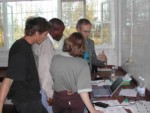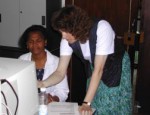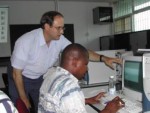Following the ELTOSA biodiversity conference and ILTER meeting at Inhaca Island in Mozambique, William Michener, Peter McCartney, John Porter and Kristin Vanderbilt traveled to Maputo, the capitol of Mozambique, to teach a two-day (25-26 July 2002) ecoinformatics workshop at Eduardo Mondlane University.
Eighteen individuals, ranging from Information/GIS Managers to Research Program and Field Station Directors, from Mozambique, Namibia, Kenya, Botswana, Tanzania, and South Africa attended the course. Training topics included:
- Lessons learned during database development in the LTER network
- Data sharing and data policies
Information management system basics including:
- System components
- Data collection strategies and hardware and software considerations
- Making information available on the WWW
- Metadata
- Quality assurance and quality control
- Data models for ecological databases
- Designing databases using MS Access
- Querying databases via SQL
- Linking databases to the WWW
- Workshop synthesis
- Evaluations and follow-up activities
Three hands-on exercises provided working experience in creating Web pages, creating a MS Access database and data entry forms, and linking an Access database to the Web.
Several of the "students" had significant experience with particular software or concepts that they brought into the discussion. In particular, Judith Kruger (South Africa) and Piotr Wolski (Botswana) added numerous helpful suggestions and comments. Joh Henschel (Namibia) and Feetham Banyikwa (Tanzania) both expressed considerable interest in expanded ecoinformatics training in their countries. Dr. Banyikwa is interested in having in-country training for up to two weeks in DBMS, GIS, and WWW programming.
Most importantly, the attendees perceived a need for continued networking among information management personnel in the various southern Africa countries. All felt they would benefit substantially from sharing tools, concepts, and experiences on an annual basis-as has been the experience for LTER information managers in the U.S.
Following the Maputo workshop, LTER scientists/information managers (Michener, Porter and Vanderbilt) traveled to Kruger National Park for a South Africa site visit that was organized by Judith Kruger and Harry Biggs. As part of the site visit, the LTER group presented a tag-team seminar on LTER Information Management and Database Development that was well attended by KNP scientific staff. They also reviewed the KNP GIS, database digital entry efforts, database management efforts funded by the Mellon Foundation, and the natural history collections onsite. Following formal meetings at the Park headquarters, the team visited numerous habitats and met with several Rangers and trackers, reviewing KNP data collection and reporting efforts.
Overall, the LTER Information Management contingent felt that the Training Workshop and South Africa site visit were quite successful. Kristin Vanderbilt observed that "the African students were by far the most motivated group" she has taught as an information management workshop instructor. She noted that they were "keenly interested in information management", and many impressed her with their "sophisticated knowledge of computers."
The LTER team recognized an obvious and pressing need for continued networking and informatics development in southern Africa. South Africa serves as a case in point. Despite their relatively high degree of funding (internally, as well as supplemental funding from the Mellon Foundation), there was significant concern about the immense backlog of invaluable data that have been or are being lost due to data entropy processes and their difficulty in maintaining progress without supplemental funding from Foundations. Nevertheless, we were all impressed by the enthusiasm of the scientists and rangers that we met, the considerable need for long-term ecological research and the informatics underpinnings, and the exceptional opportunities for international collaboration in southern Africa.

 Enlarge this image
Enlarge this image

